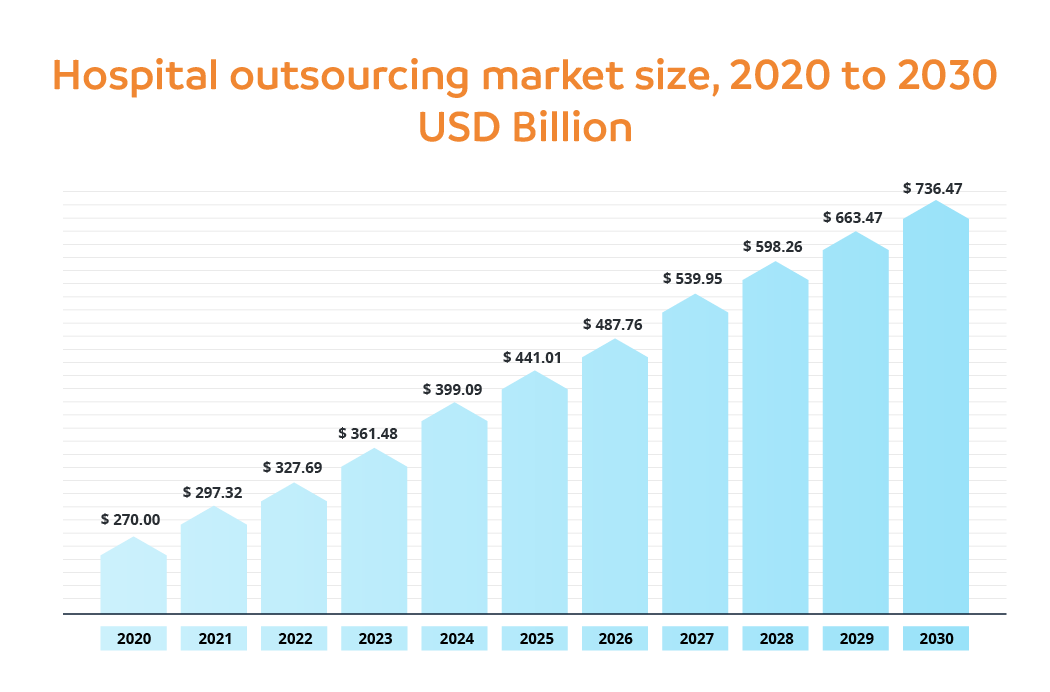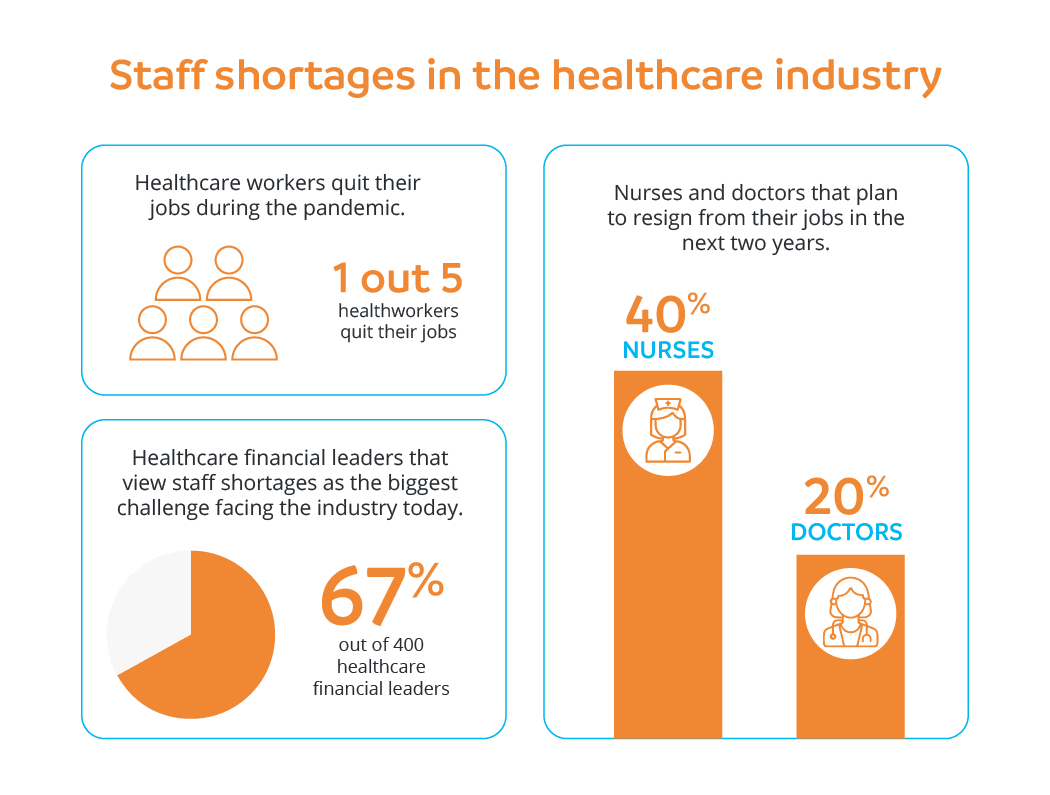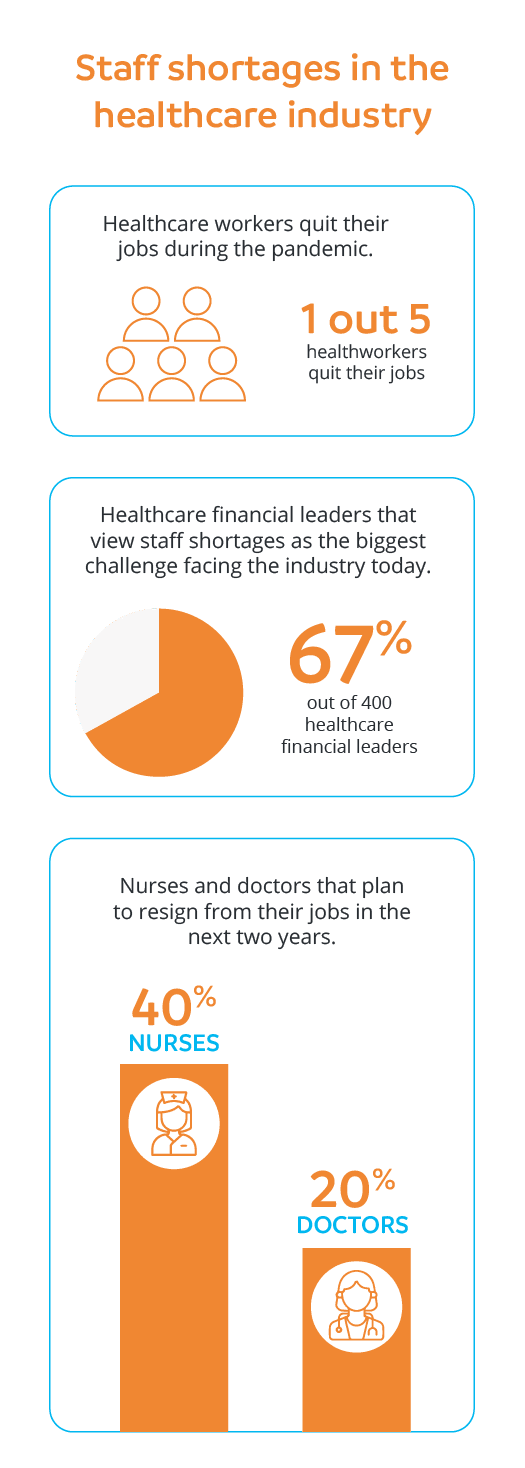Ultimate list of healthcare outsourcing statistics
Few industries have a passion for numbers quite like healthcare. While various sectors generate, store and analyze data, hospitals and health services have taken this to the next level in their bid to improve the services they provide. Much of this phenomenon has been inspired by the sheer mass of numbers that the healthcare industry has at its fingertips. From electronic health records and patient admission data to medical research results and wearable devices, the modern healthcare sector is constantly producing numerical insights that can be converted to useful, actionable information.

In a similar vein, statistics continue to emerge that highlight the vital role outsourcing is playing in helping healthcare providers stay ahead of competitors in an increasingly challenging environment. As recently highlighted by respected business publication Forbes, U.S. hospitals and health systems are facing a series of financial challenges including falling federal public health emergency funding, costlier inpatient stays and decreasing outpatient revenue1. Times are tough, which is why many health administrators are interested in numbers that reinforce the benefits of outsourcing.

With that in mind, we have compiled a list of key outsourcing statistics that show why so many hospitals and health services are embracing the practice, along with insights into its growth drivers and market trends.
What is healthcare outsourcing?
Healthcare outsourcing involves the use of external providers and resources to deliver certain medical or health-related tasks. Such activities can include administrative responsibilities such as billing, coding, IT support and accounting to more specialized services like telehealth and radiology and laboratory services.
Healthcare outsourcing - by the numbers
- A study of more than 500 hospitals and inpatient organizations found 90% of health executives are exploring cost savings by teaming with third-party vendors2
- The global healthcare outsourcing market is tipped to reach $312 billion by 20253
- The U.S. healthcare outsourcing market is expected to reach $66 billion by 20254
- Billing errors cost the medical sector about $20 billion each year5
- 98% of C-level executives are actively considering adopting outsourcing or have already done so6
- More than 90% of U.S. hospitals have outsourced at least one of their processes7
- 54% of health CFOs believe outsourcing will increase efficiency and improve their organization’s financial health8
- Of physician groups with 10 or more practitioners, 68% outsource a combination of collections and claims management9
- 71% of healthcare financial leaders say the competition for staff talent has a negative impact on their operations10
- 40% of nurses say they plan to walk away from the job in the next two years, with more than 20% of doctors considering doing the same11
- Almost 75% of hospitals over 300 beds outsource IT services and even more hospitals and health systems with less than 300 beds do the same12.

Source: Hospital Outsourcing Market Size, Share, Report 2021-2030 (precedenceresearch.com)
General outsourcing – by the numbers
- 83% of small businesses planned to maintain or increase spending on outsourced business services in 202313
- About 300,000 jobs are outsourced in the U.S. each year14
- 92% of G2000 companies use IT outsourcing15
- Companies that outsource HR can achieve an average return on investment of 27.2%16
- 90% of companies consider cloud computing as a key enabler in their outsourcing efforts17
- Seven of the top 10 countries on the Global Services Location Index (a tool used for measuring a country's attractiveness for outsourcing) are in the Asia-Pacific region18
- Almost 10% of the Philippines’ GDP comes from business process outsourcing19
- Businesses that outsource to the Philippines can cut labor costs by up to 70%20.
Growth drivers of outsourcing in healthcare
- Improved patient care: unlike some sectors where profit is king, healthcare leaders must never lose sight of what truly matters – the patient. Outsourcing administrative work allows clinical staff to not only spend more time on patient care than paperwork but eases the considerable risk of stress and burnout that impacts so many practitioners. Transferring repetitive and time-consuming tasks from in-house staff to offshore providers is a key step towards investing more heavily in clinical care, which is crucial for improving service quality and patient satisfaction, which leads to patient loyalty and brand preference.
- Cost savings: outsourcing has long been a winning strategy for businesses looking to reduce costs and that is no different for the healthcare sector. The lower cost of living in offshore hotspots such as the Philippines means hospitals and health services can save up to 70% in wages and salaries, not to mention the financial benefits of reducing expenses associated with recruitment, training and acquiring and maintaining technology. Outsourcing is a great way for healthcare organizations to improve both cash flow management and capital investment strategy.
- Better patient experience: amid the myriad of data healthcare operators have access to is a proven fact – positive patient experience scores correlate to better financial performances. Patient experience is the culmination of a patient’s interaction with a healthcare provider – from booking an appointment to post-operative care – and studies have shown that hospitals that score ‘excellent’ have 2.9% higher profit margins than those scored low21. Quality outsourcing providers help improve efficiencies, increase accuracy and allow clinicians to spend more time on care, all of which adds up to better patient experience.
- Access to global talent: with talent shortages one of the greatest headaches facing hospital and health administrators, outsourcing provides them with the opportunity to tap into a global pool of candidates that would not otherwise be within reach. Quality offshore providers invest heavily in curating talent networks filled with experienced and skilled candidates who relish the opportunity to work with onshore organizations. A prime example is the Philippines, which produces tens of thousands of highly skilled nursing graduates each year who often grasp the chance to support U.S. clients.
Healthcare outsourcing market trends
Just as healthcare services are constantly searching for ways to improve patient care, the outsourcing providers that support them have a vested interest in staying abreast of the latest trends that can impact their performance.
Talent shortage to continue
For all the benefits of AI and telehealth technology, healthcare will always be about people caring for people. For that reason, the talent shortage gripping the sector is a huge concern. Fortunately, help is at hand in the form of outsourcing partners that specialize in recruiting workers with first-hand knowledge of the sector’s requirements. As recently reported by the Manila Bulletin, the Philippines has emerged as “the world’s leading destination for healthcare business process outsourcing”22, with the country’s outsourced medical billing companies alone estimated to have collectively raised revenues of more than $15 billion in 202223.


Source: What is Healthcare BPO and Why Should You Outsource It? (boothandpartners.com)
Increasing use of artificial intelligence (AI)
In a world where many businesses are under pressure to do more with less, AI-powered solutions are allowing outsourcing providers to do just that. Repetitive and time-consuming administrative tasks have long been a heavy burden for hospitals and health services but AI technology is allowing offshore partners to accomplish them efficiently and accurately, with the likes of data collection, health billing, claims processing and medical transcription all suited to the power of AI.
Telehealth support on the rise
Remote consultations were on the rise before the world heard of COVID-19 but the pandemic has seen telehealth become commonplace in recent years. A McKinsey & Company study found 40% of consumers planned to continue using telehealth - up from 11% prior to COVID-1924, while the global telehealth market - valued at $83.5 billion in 2022 - is projected to expand at a compound annual growth rate of 24% from 2023 to 203025. Running a seamless telehealth operation is not cheap though, which is why many medical providers are increasingly turning to outsourcing providers to provide support with establishing and maintaining such platforms. Look for this trend to grow as they bid to find ways to streamline support for patients seeking telehealth services.
Summary
Healthcare services play a vital role in any society, which is why it is reassuring to know that they are not needing to go it alone. The ability of outsourcing providers to deliver crucial support not only in times of need but as a matter of course is reassuring for clinicians, administrators and patients alike. There is a reason there are so many statistics that reinforce the demand for such partnerships and it will be no surprise to see the case for healthcare outsourcing become even stronger in days to come.
The global medical coding market is estimated to reach more than $30 billion by 202626 and many executives are grappling with how to best navigate the complex and costly field. Discover how offshore providers are helping ease the strain for hospitals and health services of all sizes.
Reference:
[1] Under Financial Pressure, How Are Health Systems Prioritizing Digital Health Investments? (forbes.com)
[2] Pressures of Value-Based Care Reforms Trigger Sharp Increase in Clinical Outsourcing Partnerships, Black Book Survey Results | Company Newsroom of Black Book Market Research (newswire.com)
[3] 5+ Interesting Healthcare Outsourcing Statistics - FGC (fgcplus.com)
[4] U.S. Healthcare Outsourcing Market - Forecast (2020 - 2025) (researchandmarkets.com)
[5] The Cost Of Medical Billing Mistakes – Medical Billing Company – Boston, MA (medicalhealthcaresolutions.com)
[6] Page not found (promedllc.com)
[7] Healthcare IT Outsourcing & How It Works (plexteq.com)
[8] Hospitals, physicians poll-in on RCM outsourcing: 10 statistics to know for 2016 (beckershospitalreview.com)
[9] Hospitals, physicians poll-in on RCM outsourcing: 10 statistics to know for 2016 (beckershospitalreview.com)
[10] Competition for talent emerges as top worry for healthcare leaders (chiefhealthcareexecutive.com)
[11] The toll of COVID-19 burnout: 2 of 5 nurses, 1 of 5 doctors plan to leave practice (chiefhealthcareexecutive.com)
[12] Providers to Adopt IT Outsourcing Solutions in 2016 as More Hospitals and Physician Practices Slide Deeper Into Financial Uncertainty, Black Book Survey (prnewswire.com)
[13] Small Business Outsourcing Primed to Boom in 2023 | Clutch.co
[14] What You Need to Know About Outsourcing: Which Outsource Service is Right for You? - Aptude, LLC. A New Era Technology Company
[15] ISG Research - View (isg-one.com)
[16] napeo.org/docs/default-source/member-resources/white-paper-7-the-roi-of-using-a-peo.pdf
[17] www2.deloitte.com/content/dam/Deloitte/us/Documents/process-and-operations/us-how-much-disruption.pdf
[18] Toward a global network of digital hubs - Kearney
[19] Outsourcing to the Philippines - the state of play (matchboard.com.au)
[20] Reduce operational costs with our outsourcing services (microsourcing.com)
[21] us-dchs-the-value-of-patient-experience.pdf (deloitte.com)
[22] Healthcare BPO Philippines: The Global Epicenter of Innovation (mb.com.ph)
[23] The Top Outsourced Medical Billing Companies in the Philippines (sourcefit.com)
[24] Telehealth: A post-COVID-19 reality? | McKinsey
[25] Telehealth Market Size, Share, Growth & Trends Report, 2030 (grandviewresearch.com)
[26] Insights on the Medical Coding Global Market to 2026 - (globenewswire.com)
Popular posts
Browse by topic
- Accounting
- Accounting & Finance
- All Industries
- Banking
- BPO/RPO/HRO
- Communication
- CSR & ESG
- Customer & Client Acquisition
- Customer Experience
- Cybersecurity
- Cybersecurity & Compliance
- Data Management
- Digital Operations
- Digital Transformation
- eCommerce
- Education
- Employee Engagement
- Engineering & Construction
- Financial Services
- Healthcare
- Hospitality and tourism
- HR & Recruitment
- Information Technology
- Insurance
- Legal Services
- Logistics
- Offshoring & Outsourcing
- Outsourcing
- Professional Services
- Real Estate
- Retail & eCommerce
- Startups
- Talent Acquisition and Retention
- Technology
- Trends & Guides
- Workforce Integration
Related Posts
How employers can reduce healthcare costs
A lot has been written about how the working world has changed in the wake of the COVID-19 pandemic. Where many managers once linked productivity..
Defining data – the difference between data privacy, data security and data protection
There is no shortage of issues that can inspire sleepless nights for business leaders. Talent shortages, regulatory pressures, shrinking budgets and..
Finding value in partnerships: evaluating offshore providers for healthcare cost management
Academic journal The Conversation did not hold its punches when it recently turned its attention to a crisis engulfing the healthcare sector. Beneath..
